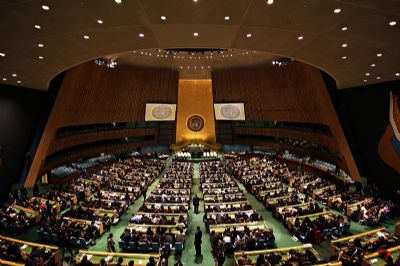On June 12, 2014 the UN General Assembly convened a review of its "Global Counter-Terrorism Strategy." The UN "strategy" was first adopted on September 8, 2006.
Discussions about countering terrorism at the UN are always fraught with a certain difficulty - the absence of a UN-agreed definition of terrorism. The prime reason for the standoff is the insistence of the Organization of the Islamic Conference (OIC) that various targets - like Israelis - are always fair game. The Arab Terrorism Convention and the Terrorism Convention of the Organization of the Islamic Conference (OIC) define terrorism to exclude armed struggle for liberation and self-determination. This claim purports to exclude blowing up certain civilians from the reach of international law and organizations.
In keeping with this outlook, the General Assembly's "counter-terrorism" discussion on June 12 included the following:
Egypt, speaking on behalf of the OIC, "rejected any attempt to associate terrorism with any religion," and called for addressing the issue of financing of terrorism "in an impartial, non-political manner." The Islamic states also objected to "unilateral elaboration of lists accusing States of allegedly supporting terrorism".
The Cuban representative accused the United States for organizing financing and executing "terrorist acts" against his country while Russia lectured on "the need to ensure security and promotion of fundamental rights."
Senegal was worried about "root causes" of terrorism like "discrimination" and "poverty" and suggested "dialogue and tolerance promoting mutual respect between all cultures, beliefs and religions".
Pakistan was concerned with "conditions conducive to the spread of terrorism", while Qatar bragged about establishing "a centre for peaceful dialogue".
Kyrgyzstan's idea of fighting terrorism includes "enhancing education, job creation" because "terrorism cannot be overcome by the use of force."
Malaysia's recipe for fighting terrorism is eradicating "hard core poverty", and ensuring "equitable economic growth."
At the end of the meeting Iran accused Israel of "genocide, crimes against humanity, war crimes" as well as being "behind the most horrific terrorist acts of our time." On the actual battlefield, Iran continued its role as the main state sponsor of terrorism - a fact of no interest to the majority of members of the General Assembly.
June 12, 2014
U.N. meeting on "counter-terrorism" upstaged by terrorist state sponsors
Date
June 12, 2014
Title
UN meeting on “counter-terrorism” upstaged by terrorist state sponsors

